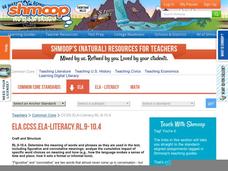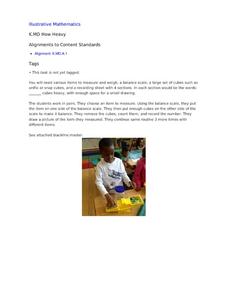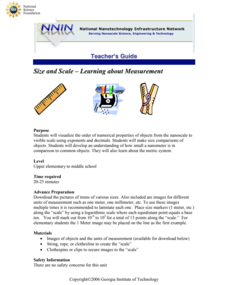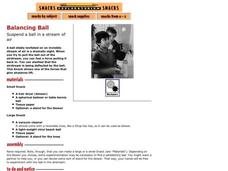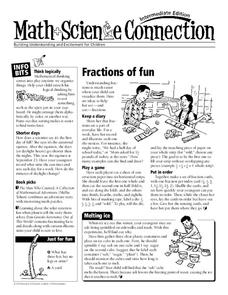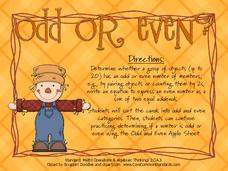Curated OER
Subject and Object Pronouns: Challenges
Enhance problem solving skills while refining grammar proficiency with a learning game focused on subject and object pronouns. With playing cards in hand, class members create a dialogue in which one presents a problem while the other...
Illustrative Mathematics
Which Weighs More? Which Weighs Less?
Expand the the comparative language of young mathematicians with a hand-on weight measurement activity. Working independently or in pairs, children compare the weight of large wooden blocks to various other classroom objects, recording...
Shmoop
ELA.CCSS.ELA-Literacy.RL.9-10.4
The fourth standard for reading literature in the Common Core calls for young readers to be able to determine the figurative and connotative meanings of words and phrases. Use this resource, a continuation of a series of Common Core...
Curated OER
How Heavy
Break out the balances for this primary grade lesson on weight measurement. Using common elementary school manipulatives like unifix or snap cubes, young mathematicians determine the weight of four different classroom objects. A graphic...
Shmoop
ELA.CCSS.ELA-Literacy.L.9-10.1
If you're completely lost on what grammar you should cover for Common Core skill L.9-10.1, look here! You will find some ideas and examples on what to include, making sure your learners can master the skill. The multiple choice quiz is...
National Nanotechnology Infrastructure Network
Size and Scale – Learning about Measurement
Can you visualize one billionth of a meter? It's not easy to understand the scale of a nanometer. Learners use a hands-on lesson to develop an understanding of the size of a nanometer in comparison to common objects. They walk away with...
It's About Time
The Mu of the Shoe
What is mu? Emerging scientists explore the coefficient of sliding friction, or mu, and apply its concepts as they complete activities in the interesting lesson. They measure the sliding friction between soles of their own athletic shoes...
Kindergarten Kindergarten
Living and Non-Living Sort
What do an ice cream cone, bicycle, and alarm clock all have in common? That's exactly what young scientists will find out as sort these pictures and learn about the differences between living and non-living things.
Exploratorium
Balancing Ball
Demonstrate lift to the class that is studying aerodynamics. In the stream of air produced by a blow dryer, little physicists place a wad of tissue paper and a spherical figure to compare. Or, if you have a vacuum cleaner and beach ball,...
Teach Engineering
What is a Nanometer?
Teams learn about the size of a nanometer by measuring objects and converting those measurements. A worksheet then tests the groups' abilities to use nanometers by having them determine the size of objects that are too small to...
Teach Engineering
Density Column Lab - Part 1
Mass and density — aren't they the same thing? This activity has groups use balance beams and water displacement to measure several objects. The pupils use the measurements to calculate the density of the objects.
Teach Engineering
Density Column Lab - Part 2
Groups suspend objects within layers of liquids to determine the densities of different liquids and compare them to the densities of objects calculated in Part 1. The groups then carefully test their calculations by layering the...
Teach Engineering
Scale Model Project
Try your hand at scale models. Scholars create a scale model of an object using a scale factor of their choice. As part of the project, they give presentations on their processes and calculations. This is the last installment of the...
Space Race
Sensory Detectives
Test your learners' sensory awareness with three hands-on activities that ask pupils to use their other senses to identify and describe everyday objects hidden from sight.
Illustrative Mathematics
3-D Shape Sort
From the apple on your desk and the coffee cup in your hand, to the cabinets along the classroom wall, basic three-dimensional shapes are found everywhere in the world around us. Introduce young mathematicians to the these common figures...
Texas State Energy Conservation Office
Investigation: Kinetic and Potential Energy
A well-developed lab sheet guides physical science learners through an investigation of kinetic and potential energy. In small groups, collaborators discover whether or not the ramp height or mass of an object has an effect on the...
Star Date
Modeling the Night Sky
Dramatize the stars and planets as they become a visual representation of the solar system in this activity. Young astronomers track and simulate various constellations as they orbit the Earth to learn the position and motion of...
Curated OER
Expressing Ideas
Before a child can write in detail, he/she needs to be able to identify what the details are. To build an understanding of how to add or express details in describing an object, place, or person, learners match the detail cards to the...
Illustrative Mathematics
Comparing Speeds in Graphs and Equations
Compare two different proportional relationships on a graph. It is up to your mathematicians to determine which of two moving objects have greater speed. A good example of a Common Core multiple choice question.
Resources for Educators
Fractions of Fun
Reinforce concepts and encourage learner engagement with a collection of math games, science experiments, and cross curricular activities. In one fun resource, learners sort objects, keep a diary of everyday fractions, play a game using...
Illustrative Mathematics
How Thick Is a Soda Can I?
The humble soda can gets the geometric treatment in an activity that links math and science calculations. After a few basic assumptions are made and discussed, surface area calculations combine with density information to develop an...
Illustrative Mathematics
Shape Hunt Part 1
The hunt is on! Send young mathematicians on a search for shapes in the first lesson of this two-part series. Each time a child finds a hidden shape, he draws it on his paper, and continues searching for the rest. Perform this activity...
Curated OER
Odd or Even
Children are told that an odd number is one that does not have a partner and an even number is one that has a partner. It's not the way I would explain it, but no matter, the activity and worksheet are still good. Children analyze...
Exploratorium
Radioactive Decay Model
Toss 100 pennies (or poker chips or any other two-different-sided objects) and remove all of those displaying tails. Line them up and repeat. The lines of pennies collected get smaller each time, successfully representing half-life.


